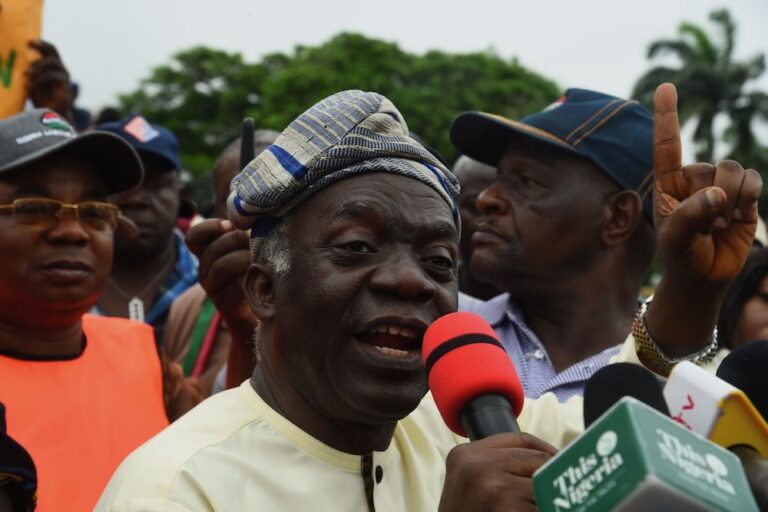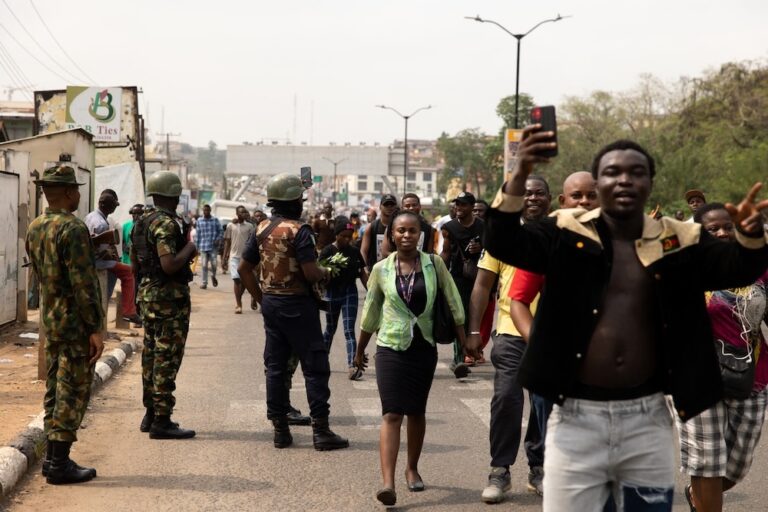(IFJ/IFEX) – The IFJ on 22 September 1998 called on the Nigerian government to withdraw proposals to amend the countryâs Constitution to establish a National Mass Media Council. In a letter to Nigerian leader General Abdulsalam Abubakar, Aidan White, General Secretary of the IFJ states that “The vague and general terms in which the functions […]
(IFJ/IFEX) – The IFJ on 22 September 1998 called on the Nigerian government
to withdraw proposals to amend the countryâs Constitution to establish a
National Mass Media Council. In a letter to Nigerian leader General
Abdulsalam Abubakar, Aidan White, General Secretary of the IFJ states that
“The vague and general terms in which the functions of the Commission are
defined contain particular dangers. They provide scope for interference in
the work of journalists and the operation of the media.” The IFJ expressed
concern about the proposal, which will allow the Commission to “monitor”
media organisations and deal with professional standards “as the President
may from time to time direct or the National Assembly may by Act prescribe.”
Mr White stated that the IFJ strongly supports efforts to strengthen
democracy in Nigeria but “we have a sense that this current draft may well
do more damage than good.”
The letter follows:
Dear General Abdulsalam Abubakar,
The International Federation of Journalists, the worldâs largest
organisation of journalists, is extremely concerned at proposals to amend
the Constitution which would establish a National Mass Media Commission.
The IFJ shares the dismay of many Nigerian journalists in membership of the
National Union of Journalists, that, as currently drafted, Section 46 (2) of
the draft Constitution, concerning the proposed Commission, is unsafe and
could be used to stifle press freedom and to limit the investigative role of
mass media.
The vague and general terms in which the functions of the Commission are
defined contain particular dangers. They provide scope for interference in
the work of journalists and the operation of media. This could undermine
profoundly the robust character of press freedom in Nigeria.
We are not convinced that the Commission is itself necessary. We note the
efforts of media professionals in Nigeria to establish effective self
regulation through the Nigerian Press Council. We are also aware that
current laws and institutions covering the exercise of journalism in Nigeria
provide ample opportunities for redress regarding matters of privacy and
harassment.
Inadvertently, this Commission, even when established in good faith, could
develop into a millstone around the neck of journalists. The text now under
consideration in clauses 46 (2) (d) and (e) would provide opportunities for
individuals, including public figures, to evade scrutiny by media without
apparent recognition of the legitimate right of inquiry of journalists in
the public interest.
In addition, we note the plan to authorise the Commission to “monitor” media
organisations, to “co-ordinate” the activities of professional bodies and to
“deal with other matters including code of conduct professional and ethical
standards as the President may from time to time direct or the National
Assembly may by Act prescribe.” The failure to specify in narrow and clear
terms the precise responsibilities of the Commission adds to our unease.
We believe that self regulation by media professionals without the direct
involvement of governmental institutions at any stage provides the best
mechanism for ensuring media accountability.
The IFJ strongly supports efforts to strengthen democracy in Nigeria, and we
welcome anything that will remove obstacles to the exercise of journalism,
but we have a sense that this current draft may well do more damage than
good.
We urge you to withdraw this proposal.
We recommend most strongly that there is a comprehensive and extensive
consultation process with media professionals before engaging in any process
which would lead to Constitutional changes affecting media and the rights of
journalists.
Yours Sincerely,
AIDAN WHITE
General Secretary
Similar appeals should be sent to:
Appeals To
General Abdulsalam Abubakar
Chairman of the Provisional Ruling Council
and Commander in Chief of the Armed forces
State House,
Abuja, Federal Capital Territory, Nigeria
Fax:+234 95 232 138
Please copy appeals to the source if possible.


